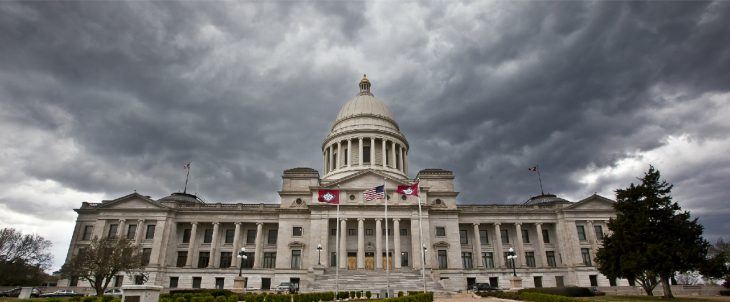Sen. Hendren: Hate crimes could be considered in special session
by August 21, 2020 2:30 pm 670 views

A hate crimes bill revealed by Arkansas Gov. Asa Hutchinson, Attorney General Leslie Rutledge and legislative leaders Aug. 20 could be considered in a special session if enough support exists, Senate Majority Leader Jim Hendren, R-Gravette, said Friday (Aug. 21). If not, it will be introduced the first day of next year’s regular session.
Hendren made the comments during a Zoom meeting of the Rogers-Lowell Area Chamber of Commerce Government Affairs Committee. He had slipped out of a meeting of the Arkansas Senate Republican Caucus.
Hendren is sponsoring a bill creating a sentencing enhancement for crimes committed “due to a victim’s race, color, religion, ethnicity, ancestry, national origin, homelessness, gender identity, sexual orientation, sex, disability, or service in the United States Armed Forces.”
For those found guilty, it could lead to an additional term of imprisonment equal to 20% of the term of the crime; an additional 20% fine; and additional terms of probation or sentence suspension. The legislation also requires the collection of data related to hate crimes.
Hendren noted that the governor had said the legislation will be considered “in the next meeting of the Arkansas General Assembly” Aug. 20, which could be a special session. A special session could depend on there being sufficient support, on there being another reason to meet, and on the state of the pandemic in central Arkansas and across the state.
“Who knows? There’s not been a decision made except that the next time we get together, the Legislature’s going to have a hate crimes bill with some broad support to consider, and hopefully to pass, and hopefully it’s a bill that again is recognized as truly something that’s going to have an impact,” he said.
He said the effort is supported by a coalition that includes the governor, attorney general, and most if not all Democratic legislators. He said it has “huge support from the business community, which is going to be critical to this.” He said he had walked his own caucus through the legislation that morning, and Republican support is beginning to grow.
“We’ve got some work to do,” he said. “We’ve got to build some support, and also trying to make them understand, again, the economic impacts and realities of failing at this effort.”
Arkansas is one of three states, along with South Carolina and Wyoming, that does not have a hate crimes law.
“I hope we can get the support we need to get it done sooner rather than later because it’s just embarrassing, to be honest with you, where Arkansas is in this regard right now,” Hendren said.
Hendren said legislators met Aug. 20 regarding conducting business next year in a pandemic environment. Legislators may work full days on Fridays, hold meetings only in larger committee rooms, and limit public access. There could be more Zoom meetings, proxy voting and temperature checks.
He expects legislators next year to have a “robust discussion” regarding limiting the governor’s executive authority. Some legislators are uneasy about the governor’s ability to extend emergency declarations and use executive powers. He said the governor’s emergency powers were envisioned by many to be used for short-term natural disasters, catastrophes such as a train derailment, or a war, not a long-lasting pandemic.
He said concerns by legislators “vary from one member to another. Some are ready to ignore the virus, open everything up and call it good. Others just feel like the Legislature needs to have input in those decisions.”
Hendren said the governor must be able to make nimble decisions, but he said he doesn’t have a problem with the Legislature reviewing executive orders for emergencies that last longer than 60 or 90 days.
“I don’t think that you’re going to see enough support to do draconian things that would limit future governors,” he said. “At least, I hope not.”
He said he hopes that the governor ends the current state of emergency when the Legislature will be in session. That would allow the Legislature to extend pandemic measures such as COVID-19-related liability protection for business owners and the increased use of telemedicine. He said he could not imagine the Legislature not renewing the liability protections.
Otherwise, he expects a more limited agenda than has occurred in recent sessions. Larger tax reductions may be “paused” because of economic uncertainties. Other potential discussion topics include tort reform, responding if voters defeat a proposal to extend the half-cent highway tax, teacher pay, and stabilizing state employee and teacher retirement systems.
“I have not so far felt that we’re going to have that aggressive of an agenda,” he said. “Now, that could change.”
